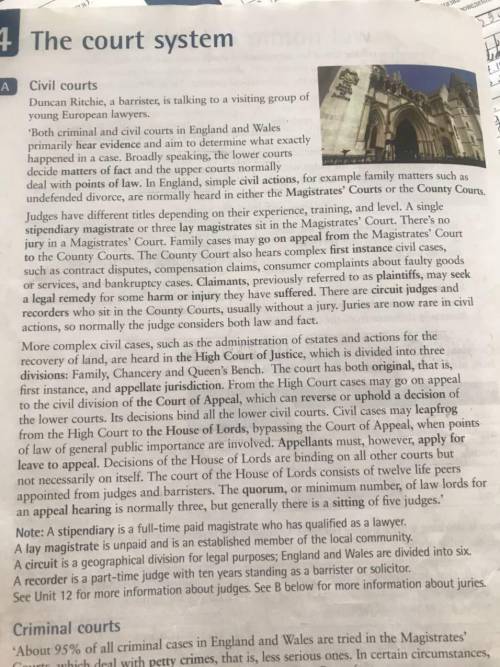
1. What animal is the fastest? Is a train faster than a plane?
2. My sister is heavier than me. Our dad is the heviest of all in the family.
3.A crocodile is more dangerous than a dog. The most dangerous animal is a snake, I think.
4. A mouse is smaller than a cat. The white puppy is the smallest.
5. An elephant is larger than a tiger. A whale is the largest animal in the world.
6. My room is lighter than yours, it has two big windows. This bag is the lightest of all.
7. This type of flowers is rarer than a rose. These animals are the rarest at the Zoo.
8. This mistake is more common in English than in Russian. These mistakes are the most common.
9. This film is worse than that one I saw last week. This is the worst book I have ever read.
10. Your dress is better than hers. Your dress was the best at the party.
Объяснение:
Civil courts
The lower courts decide matters of fact and the upper courts normally deal with points of law.
Judges have different titles depending on their experience, training, and level. A single stipendiary magistrate or three lay magistrates sit in the Magistrates' Court. There's no jury in a Magistrates' Court. The County Court also hears complex first instance civil cases. There are circuit judges and recorders who sit in the County Courts, usually without a jury.
More complex civil cases are heard in the High Court of Justice, which is divided into three divisions: Family, Chancery and Queen's Bench. From the High Court cases may go on appeal to the civil division of the Court of Appeal, which can reverse or uphold a decision of the lower courts. Civil cases may leapfrog from the High Court to the House of Lords, bypassing the Court of Appeal, when points of law of general public importance are involved. The court of the House of Lords consists of twelve life peers appointed from judges and barristers. The quorum of law lords for an appeal hearing is normally three, but generally there is a sitting of five judges.